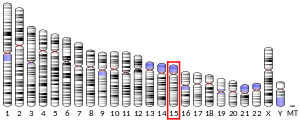AP3S2
Protein-coding gene in the species Homo sapiens
| AP3S2 | |||||||||||||||||||||||||||||||||||||||||||||||||||
|---|---|---|---|---|---|---|---|---|---|---|---|---|---|---|---|---|---|---|---|---|---|---|---|---|---|---|---|---|---|---|---|---|---|---|---|---|---|---|---|---|---|---|---|---|---|---|---|---|---|---|---|
| Identifiers | |||||||||||||||||||||||||||||||||||||||||||||||||||
| Aliases | AP3S2, AP3S3, sigma3b, adaptor related protein complex 3 sigma 2 subunit, adaptor related protein complex 3 subunit sigma 2 | ||||||||||||||||||||||||||||||||||||||||||||||||||
| External IDs | OMIM: 602416; MGI: 1337060; HomoloGene: 100592; GeneCards: AP3S2; OMA:AP3S2 - orthologs | ||||||||||||||||||||||||||||||||||||||||||||||||||
| |||||||||||||||||||||||||||||||||||||||||||||||||||
| |||||||||||||||||||||||||||||||||||||||||||||||||||
| |||||||||||||||||||||||||||||||||||||||||||||||||||
| |||||||||||||||||||||||||||||||||||||||||||||||||||
| Wikidata | |||||||||||||||||||||||||||||||||||||||||||||||||||
| |||||||||||||||||||||||||||||||||||||||||||||||||||
AP-3 complex subunit sigma-2 is a protein that in humans is encoded by the AP3S2 gene.[5][6]
Interactions
AP3S2 has been shown to interact with AP3B1.[7]
References
- ^ a b c GRCh38: Ensembl release 89: ENSG00000157823 – Ensembl, May 2017
- ^ a b c GRCm38: Ensembl release 89: ENSMUSG00000063801 – Ensembl, May 2017
- ^ "Human PubMed Reference:". National Center for Biotechnology Information, U.S. National Library of Medicine.
- ^ "Mouse PubMed Reference:". National Center for Biotechnology Information, U.S. National Library of Medicine.
- ^ Dell'Angelica EC, Ohno H, Ooi CE, Rabinovich E, Roche KW, Bonifacino JS (Apr 1997). "AP-3: an adaptor-like protein complex with ubiquitous expression". EMBO J. 16 (5): 917–28. doi:10.1093/emboj/16.5.917. PMC 1169692. PMID 9118953.
- ^ "Entrez Gene: AP3S2 adaptor-related protein complex 3, sigma 2 subunit".
- ^ Dell'Angelica, E C; Ooi C E; Bonifacino J S (Jun 1997). "Beta3A-adaptin, a subunit of the adaptor-like complex AP-3". J. Biol. Chem. 272 (24). UNITED STATES: 15078–84. doi:10.1074/jbc.272.24.15078. ISSN 0021-9258. PMID 9182526.
Further reading
- Maruyama K, Sugano S (1994). "Oligo-capping: a simple method to replace the cap structure of eukaryotic mRNAs with oligoribonucleotides". Gene. 138 (1–2): 171–4. doi:10.1016/0378-1119(94)90802-8. PMID 8125298.
- Dell'Angelica EC, Ooi CE, Bonifacino JS (1997). "Beta3A-adaptin, a subunit of the adaptor-like complex AP-3". J. Biol. Chem. 272 (24): 15078–84. doi:10.1074/jbc.272.24.15078. PMID 9182526.
- Suzuki Y, Yoshitomo-Nakagawa K, Maruyama K, et al. (1997). "Construction and characterization of a full length-enriched and a 5'-end-enriched cDNA library". Gene. 200 (1–2): 149–56. doi:10.1016/S0378-1119(97)00411-3. PMID 9373149.
- Rous BA, Reaves BJ, Ihrke G, et al. (2002). "Role of adaptor complex AP-3 in targeting wild-type and mutated CD63 to lysosomes". Mol. Biol. Cell. 13 (3): 1071–82. doi:10.1091/mbc.01-08-0409. PMC 99620. PMID 11907283.
- Falcón-Pérez JM, Starcevic M, Gautam R, Dell'Angelica EC (2002). "BLOC-1, a novel complex containing the pallidin and muted proteins involved in the biogenesis of melanosomes and platelet-dense granules". J. Biol. Chem. 277 (31): 28191–9. doi:10.1074/jbc.M204011200. PMID 12019270.
- Strausberg RL, Feingold EA, Grouse LH, et al. (2003). "Generation and initial analysis of more than 15,000 full-length human and mouse cDNA sequences". Proc. Natl. Acad. Sci. U.S.A. 99 (26): 16899–903. Bibcode:2002PNAS...9916899M. doi:10.1073/pnas.242603899. PMC 139241. PMID 12477932.
- Nie Z, Boehm M, Boja ES, et al. (2003). "Specific regulation of the adaptor protein complex AP-3 by the Arf GAP AGAP1". Dev. Cell. 5 (3): 513–21. doi:10.1016/S1534-5807(03)00234-X. PMID 12967569.
- Salazar G, Love R, Werner E, et al. (2004). "The zinc transporter ZnT3 interacts with AP-3 and it is preferentially targeted to a distinct synaptic vesicle subpopulation". Mol. Biol. Cell. 15 (2): 575–87. doi:10.1091/mbc.E03-06-0401. PMC 329249. PMID 14657250.
- Ota T, Suzuki Y, Nishikawa T, et al. (2004). "Complete sequencing and characterization of 21,243 full-length human cDNAs". Nat. Genet. 36 (1): 40–5. doi:10.1038/ng1285. PMID 14702039.
- Lefrançois S, Janvier K, Boehm M, et al. (2004). "An ear-core interaction regulates the recruitment of the AP-3 complex to membranes". Dev. Cell. 7 (4): 619–25. doi:10.1016/j.devcel.2004.08.009. PMID 15469849.
- Gerhard DS, Wagner L, Feingold EA, et al. (2004). "The status, quality, and expansion of the NIH full-length cDNA project: the Mammalian Gene Collection (MGC)". Genome Res. 14 (10B): 2121–7. doi:10.1101/gr.2596504. PMC 528928. PMID 15489334.
- Rual JF, Venkatesan K, Hao T, et al. (2005). "Towards a proteome-scale map of the human protein-protein interaction network". Nature. 437 (7062): 1173–8. Bibcode:2005Natur.437.1173R. doi:10.1038/nature04209. PMID 16189514. S2CID 4427026.
External links
- AP3S2 human gene location in the UCSC Genome Browser.
- AP3S2 human gene details in the UCSC Genome Browser.
- v
- t
- e

















